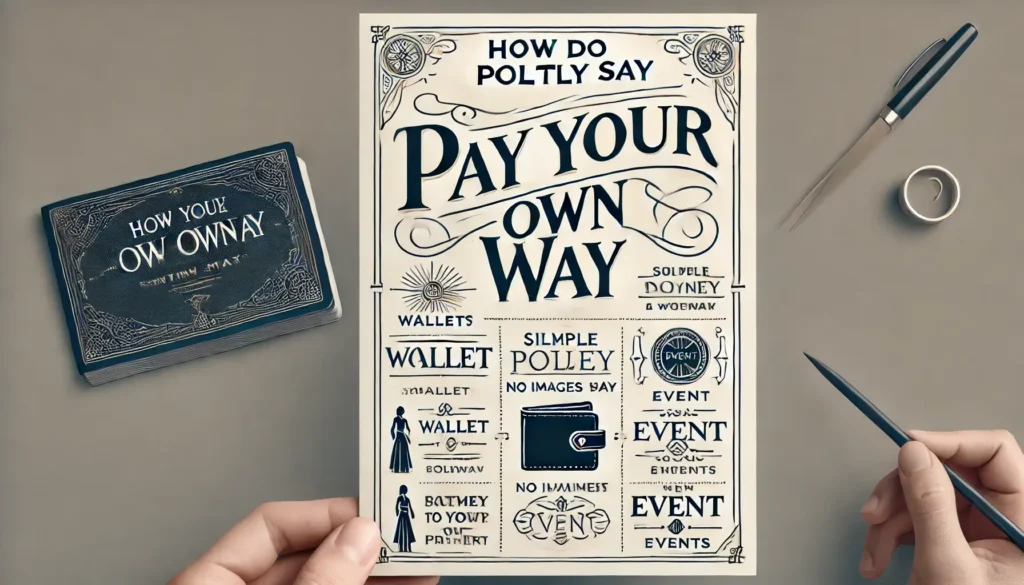
Please pay your own share. Everyone is responsible for their expenses.
Splitting bills can sometimes be a sensitive topic. Clear communication helps maintain harmony. Asking someone to pay their own share can be tricky. It’s essential to approach the topic with politeness and clarity. Using direct yet courteous language ensures no misunderstandings.
Setting expectations beforehand can prevent awkward situations. Always strive to be considerate of others’ feelings. Making sure everyone understands the arrangement ensures smooth interactions.
Setting The Tone
Asking someone to pay their own way can be a delicate matter. Setting the tone is crucial to ensure that your request comes across as polite and respectful. The right approach can make all the difference, helping you to avoid any awkwardness or misunderstandings.
Choosing The Right Words
Words carry weight, and choosing the right ones can make your message clear and courteous. Start by using phrases that are friendly and non-confrontational. Here are some examples:
- “Would you mind covering your own expenses this time?”
- “Can we go Dutch for this meal?”
- “I think it’s fair if we each pay our share.”
Using these phrases sets a polite tone and avoids any potential offense. Avoid harsh or demanding language like “You need to pay for yourself” or “I’m not paying for you.” Such phrases can come across as rude or aggressive.
Here’s a simple table to illustrate the difference:
| Polite Phrases | Harsh Phrases |
|---|---|
| “Would you mind covering your own expenses?” | “You need to pay for yourself.” |
| “Can we go Dutch?” | “I’m not paying for you.” |
| “I think it’s fair if we each pay our share.” | “You have to cover your costs.” |
Using positive language helps to convey your message without causing offense. Always aim to be clear and concise in your wording.
Considering The Context
Context matters just as much as the words you choose. Consider the situation and the relationship you have with the person. Are you close friends, casual acquaintances, or professional colleagues? Each scenario may require a different approach.
For example, with close friends, a more casual approach might be appropriate:
- “Hey, let’s split the bill this time.”
- “How about we each pay for our own tickets?”
In a professional setting, you might need a more formal tone:
- “I suggest we each handle our own expenses.”
- “Let’s agree to cover our costs for this meeting.”
Understanding the context ensures that your message is received well. Consider the location, the occasion, and any previous agreements. If you have always paid in the past, a sudden change might need a bit more explanation. You could say:
“I’ve been covering the costs lately, but can we start splitting them from now on?”
This approach provides clarity and sets expectations for the future. Being mindful of context shows respect and consideration for the other person’s feelings.
Direct Communication
When it comes to splitting bills or expenses, using direct communication is crucial. Being clear and straightforward ensures that everyone understands the expectations. This approach helps prevent misunderstandings and keeps relationships healthy. Let’s explore how to use direct communication effectively.
Clear And Concise Language
Using clear and concise language is key when addressing the issue of paying one’s own way. Being direct doesn’t mean being rude. It’s about ensuring that your message is understood without any ambiguity.
Here are some tips to keep your language clear:
- Use simple words and phrases. Avoid jargon or complex terms.
- Be specific. Instead of saying “Let’s handle the bill,” say “Everyone will pay for their own meal.”
- Avoid long explanations. Keep your message to the point.
Consider the following table for phrases that can be used:
| Situation | Suggested Phrase |
|---|---|
| Group Dinner | “Let’s each pay for our own meals.” |
| Shared Ride | “Can we split the fare evenly?” |
| Gift Purchase | “Everyone can chip in their share.” |
By using clear and concise language, you ensure that everyone knows exactly what is expected. This approach minimizes confusion and helps maintain good relationships.
Assertive Yet Respectful
Being assertive doesn’t mean being aggressive. You can be firm about your needs while still respecting others. Respectful communication shows that you value the other person’s feelings and opinions.
Here are some ways to be assertive yet respectful:
- Use “I” statements. For example, “I feel more comfortable if we each pay our own way.”
- Be polite. Use words like “please” and “thank you.”
- Maintain a calm tone. Avoid raising your voice or sounding angry.
Consider these examples:
| Situation | Assertive and Respectful Phrase |
|---|---|
| Group Outing | “I suggest we each cover our own expenses. What do you think?” |
| Shared Subscription | “Can we agree to split the cost evenly? Thanks for understanding.” |
| Joint Gift | “I’d prefer if we all contribute equally. Does that work for everyone?” |
Assertiveness is about expressing your needs clearly. Respect ensures that the other person feels valued. Combining these approaches creates effective and polite communication.
Offering Alternatives
Asking someone to pay their own way can be tricky. But, offering alternatives can make the conversation smoother. By suggesting different ways to split the cost, you can avoid awkwardness and still keep things fair. Below, we explore some polite and effective alternatives for this delicate situation.
Suggesting Splitting Costs
One of the easiest ways to handle shared expenses is by splitting the costs. This method is straightforward and fair. Here are some ways to suggest it:
- “Let’s split the bill evenly.”
- “How about we each pay half?”
- “Shall we go Dutch today?”
To make it even clearer, you can offer to handle the math or use an app:
- “I can calculate our shares if you like.”
- “We could use a bill-splitting app like Splitwise.”
Splitting costs works well in various scenarios such as dining out, group activities, or even shared gifts. Here’s a quick table to show how splitting can be done:
| Activity | Suggested Split |
|---|---|
| Dining Out | Even Split |
| Group Gift | Equal Contribution |
| Event Tickets | Each Pays Their Own |
Proposing Separate Payments
Another polite way to manage costs is by suggesting separate payments. This method ensures everyone pays exactly what they owe. Here are some ways to propose it:
- “Shall we each pay for our own meal?”
- “How about we each get our own ticket?”
- “Let’s handle our own expenses today.”
Using separate payments can avoid confusion and keep things simple. Here’s how you can suggest it without sounding rude:
- “I think it’s easier if we each pay our own way.”
- “To keep things simple, let’s handle our costs.”
- “It’s fair if we each pay for what we order.”
Separating payments is ideal for situations like:
- Going to the movies
- Ordering individual dishes at a restaurant
- Booking flights or accommodations
Offering alternatives like splitting costs or separate payments can make the conversation about money less awkward and more straightforward.
Maintaining Diplomacy
Discussing money can be tricky, especially with friends or family. Maintaining diplomacy is key when you need to ask someone to pay their own way. It helps avoid hurt feelings and keeps the relationship strong. Let’s explore ways to handle this delicately.
Emphasizing Fairness
One way to maintain diplomacy is by emphasizing fairness. Everyone appreciates when things are fair. You can use this to your advantage when discussing money.
Here are some tips:
- Split the bill equally: Suggest splitting the bill down the middle. This shows you value fairness.
- Take turns paying: Offer to pay this time and ask them to pay next time. This way, both parties share the responsibility.
- Discuss upfront: Before going out, mention that you prefer to pay separately. This avoids surprises later.
Consider the following table for a clear view:
| Situation | Suggested Approach |
|---|---|
| Dinner with Friends | Suggest splitting the bill equally. |
| Group Activity | Agree to take turns paying. |
| Casual Outing | Discuss paying separately beforehand. |
Using these tips and strategies can help you keep things fair and balanced. This ensures everyone feels respected and valued.
Avoiding Misunderstandings
Avoiding misunderstandings is crucial when talking about money. Clear communication is key.
Here are some ways to avoid confusion:
- Be direct but polite: Use clear language without being harsh. For example, “Let’s each pay for our own meal today.”
- Set expectations early: Mention your preference to pay separately at the start of the outing. This avoids awkwardness later.
- Use humor: A light-hearted comment can ease the tension. For instance, “My wallet’s on a diet, so let’s go Dutch!”
Remember these points:
- Clear communication prevents misunderstandings.
- Setting expectations early avoids confusion.
- A touch of humor can make the conversation lighter.
Being upfront and clear helps maintain a good relationship. It ensures everyone knows what to expect and avoids any awkward moments.
Addressing Group Situations
Splitting bills among friends or colleagues can be awkward. Addressing group situations where everyone pays their own way requires tact. Knowing how to politely say “pay your own” can make social outings smoother and more enjoyable for everyone involved.
Navigating Group Dynamics
In group settings, understanding group dynamics is crucial. People have different financial situations and preferences. Here’s how to navigate these dynamics effectively:
- Communicate clearly: Let everyone know upfront that the plan is for each person to pay their own way.
- Use inclusive language: Phrases like “Let’s all go Dutch” or “We’ll each cover our share” can help.
- Choose suitable venues: Pick places that accommodate various budgets.
A group dinner is a common scenario. Here’s a step-by-step approach:
- Send a message before the event: “Hi everyone, just a heads-up, we’ll each be covering our own meal tonight.”
- During the event: Remind everyone subtly. “Don’t forget, we’re splitting the bill equally.”
- At payment time: Suggest using apps like Venmo or Splitwise to make splitting easier.
Body language also plays a role. Maintain eye contact and smile to make your message friendly. This helps ensure that everyone feels comfortable and respected.
Ensuring Equitable Contributions
Ensuring everyone contributes fairly is essential for maintaining harmony. Here are some strategies to ensure equitable contributions:
- Discuss expectations: Before the outing, discuss how the bill will be split. This avoids surprises.
- Use technology: Tools like Splitwise or Venmo can simplify the process.
- Be transparent: Keep the process open. If someone orders significantly more, address it kindly.
A table can help illustrate different ways to split costs:
| Method | Description |
|---|---|
| Even Split | Divide the bill equally among all participants. |
| Pay for What You Ordered | Each person pays for their own food and drinks. |
| Rotating Payment | Each person takes turns paying the entire bill. |
Another technique is to assign roles. One person can handle collecting payments, while another can manage the math. This ensures the process is smooth and fair.
Equitable contributions not only keep the peace but also ensure everyone feels respected. By addressing these aspects thoughtfully, group outings can remain enjoyable and stress-free.
Frequently Asked Questions
How Do You Ask Someone To Pay Politely?
To ask someone to pay politely, express your request clearly but kindly. Use phrases like “Would you mind covering your portion? ” Or “Could you please settle your part? “
What Is A Polite Way To Ask For Payment?
A polite way to ask for payment is to frame it as a friendly reminder. Say, “Just a friendly reminder to cover your share. Thanks!”
How Do You Remind Someone To Pay You?
Remind someone to pay you by being courteous and clear. Use phrases like, “Just a quick reminder about the payment. Thank you!”
How Do You Tell Someone To Pay Their Share?
Tell someone to pay their share by being straightforward yet polite. Say, “Could you please pay your share? Thanks in advance!”
Conclusion
Finding the right words to request someone to pay their own way can be challenging. Use polite, clear, and respectful language. Prioritize honesty and kindness in your approach. Practicing these tips ensures that your message is well-received and maintains positive relationships.
Politeness and transparency are key.


